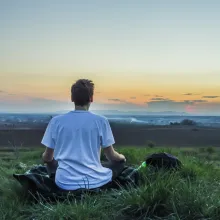
Why We Listen: A Reminder to Unplug and Tune In
It was the mid-2000’s, and I was a music minor taking Secondary Jazz Bass lessons at the University of Rochester. I remember sitting in a small practice room at the Eastman School of Music, hacking my way through a minor blues when my teacher asked me if I listened to much Jazz. I was taken aback, if not mildly offended. I explained that I had an eclectic collection of records and tapes, which included Giant Steps, Kind of Blue, and Mingus at Antibes. He chuckled kindly. “No, do you listen to Jazz every day?” Bashfully, I admitted the obvious - I did not.
My teacher explained to me that playing jazz was more than just a matter of knowing music theory. There is a feel to it, something you developed by listening to other musicians play. I was not feeling it. I was on top of the beat with not enough swing. He encouraged me to build a practice of listening to further develop my sense of rhythm and feel. He began assigning transcription assignments and suggesting artists and albums for my catalog. I expanded my listening to include a range of musicians including Wes Montgomery, Chick Corea, Grant Green, Antonio Carlos Jobim, Bill Evans, Ella Fitzgerald, and Blossom Dearie. Over time, my sense of rhythm developed. Not only did I learn the feel, I began incorporating jazz harmonies and changes into my original music. In developing an ear for jazz, I unknowingly learned the vocabulary too. By engaging in intentional listening, I learned new ways to communicate.
In the Podcasting and Radio Arts program at Youth on Record, we have developed a practice of intentional listening, not only for our students and interns, but also for our staff. It goes like this: turn off your screens, put away your phones, and just listen. By taking the time to isolate this one sense, we have the opportunity to more deeply engage with not only what is being said, but also, how it sounds. We develop an ear for a speaker’s rhythm, pitch, and cadence. We expand our conception of what constitutes a podcast by exploring a broad range of formats and production styles. Furthermore, the act of listening to a range of stories and perspectives expands our own conceptions of ourselves in relation to the world. It offers us new ways of observation and inquiry. It helps us connect with, learn from, and feel empathy for others, even if they have vastly different lived histories than our own.
In order to engage in such deep listening, however, it requires us to first create space to do so. We live in a loud world with many distractions and so much to accomplish. For many, the sound of music, or a podcast, or a TV in the background has become a normal part of everyday life. It is the soundtrack we take for granted. The practice of intentionally listening to audio–be it podcasts, or music, or in nature–gives us the chance to reconnect to the act of hearing. Having taught podcast production classes to children, teenagers, and adults for the past 8 years, one of the most common feedback I receive is that learning to make podcasts changes the way people listen. They hear more, or at least notice more of the sounds that permeate modern living. And, there sure are a lot of sounds–vehicles, appliances, HVAC systems, construction equipment–the list goes on. In fact, there are few places in the world where you can avoid anthropogenic noise for more than a few minutes.
With all this in mind, it would make sense that one of the first pieces of listening we assign to our students and interns is from Twenty Thousand Hertz, a podcast that is all about “the world's most recognizable and interesting sounds.” In their episode “Noise Pollution” they examine the broader concept of the term (what really constitutes noise pollution), and the social, physical, and environmental repercussions of human-made noise. It’s a startling reminder of how loud our world is, and an affirmation of our practice of intentional listening. We really enjoy this piece of audio and hope you do, too. If you have suggestions for other listening examples that we should add to our library, please email a link to podcasting@youthonrecord.org.


